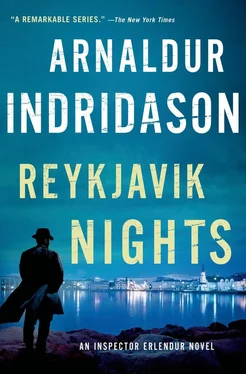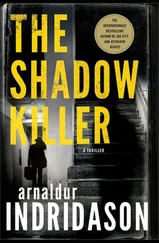When Erlendur left the Fever Hospital shortly afterwards, the drunk man was still standing in the street outside. To combat the unsteadiness of his legs he had propped himself against a fence from where he hailed Erlendur.
‘You pissed too?’
Erlendur stopped and considered the man in his thick winter coat and hat; the grimy hands, the wrinkles etched deep in his face. He could be either side of fifty.
‘No, I’m not pissed.’ Erlendur went over. ‘Won’t they take you?’
‘Arseholes,’ said the man.
‘If you sober up, they’ll give you food and shelter. They can’t have everyone wandering around drunk though, can they?’
The man gave him a look of contempt; clearly this was unworthy of a response.
‘You wouldn’t by any chance remember a guy called Hannibal? Used to come down here.’
‘Hannibal?’ the man said sharply.
‘Yes.’
‘I knew Hannibal. Why are you asking?’
‘I—’
‘He was drowned like a dog.’
‘What do you mean?’
‘What do I mean? I mean someone went out there and drowned the poor sod.’
‘Why do you say that?’
‘I just know.’
‘Did you see it?’
‘No, I didn’t. But I saw plenty of other things.’
‘Why are you so sure, then?’
‘How else did he drown in that puddle? Eh? You tell me!’
‘So you—’
‘Me? No, wasn’t me. I had nothing to do with it.’
‘So what did you see?’
‘Eh?’
‘You said you’d seen plenty of other things. What did you mean?’
‘I see things,’ repeated the tramp. ‘And I know things too. Don’t you go thinking I’m some kind of fool, mate. I’m no fool, let me tell you.’
‘Do you know things about Hannibal?’
‘Oh, leave me alone. Why don’t you talk to that stupid prick Bergmundur? He knew Hannibal better than me. Saw him in the square only yesterday. Back on the bottle, the bloody fool. Not for the first time,’ he added, with an oddly censorious expression, as if he himself never touched a drop except on special occasions.
Little was to be gained from the couple who used to live above Hannibal’s cellar. Erlendur had finally tracked them down to a grotty rented place near the swimming pool in Laugardalur. They had been out the night of the fire yet were convinced that Hannibal was responsible. Not that they spoke badly of him. In fact, they showed sympathy for his plight.
‘We didn’t mind him sleeping there,’ explained the woman whose name was Málfrídur. She had a puffy red face, a large splayed nose and a big mouth, which was prevented from closing properly by protruding teeth. Her husband, who was waiting by the stove for the coffee to percolate, also looked like a drinker: grubby vest, braces hanging down over his trousers, bare feet. The flat was dirty and there was an unpleasant smell whose source Erlendur could not identify. Burnt offal, he suspected.
‘We liked the bum,’ said the man, pouring coffee into some glasses.
‘Sad what happened to him,’ added Málfrídur.
‘He didn’t have any enemies that you were aware of?’
‘No,’ said the man, ‘but it’s tough on the streets. Wasn’t the poor sod drunk when he fell in?’
‘Do you believe he started the fire himself?’ asked Erlendur.
‘Yes, it was just him being clumsy, wasn’t it?’ said Málfrídur, her mouth hanging open.
‘Mind you, he blamed the brothers next door,’ her husband pointed out.
‘Yes, but that was a load of nonsense,’ said Málfrídur. ‘They had no motive.’
‘Any idea why he accused them?’ asked Erlendur. ‘Had he got on the wrong side of them?’
‘No, the brothers had nothing to do with it,’ insisted Málfrídur.
‘I didn’t like them,’ remarked her husband. ‘Never did.’
‘That’s different.’
‘Why didn’t you like them?’ asked Erlendur, looking at the man.
‘They wouldn’t so much as give you the time of day, even though we were neighbours. And they were mixed up in some kind of shady business, if you ask me. Selling home-made spirits — that sort of thing. Turned their noses up at us. I went round once; asked if they’d sell me some booze — I’d noticed a constant stream of people coming and going from their place. Late at night, mostly. All sorts. They denied they had any, but I know they were lying.’
‘Was Hannibal aware of this?’
‘Haven’t a clue. We never discussed it. Then all the comings and goings stopped. I don’t know if it had anything to do with me going over there. They were nasty pieces of work, those brothers.’
‘They used to be glued to their telly all evening,’ said Málfrídur.
‘Oh?’
‘Yes, it was on every night. We could see from our window. They were telly addicts, if you ask me. Total addicts.’
‘Then they moved out,’ said the man.
‘Yes, soon after that business with Hannibal,’ added the woman. ‘And we haven’t laid eyes on them since.’
Erlendur stood at the Grensásvegur — Miklabraut junction, directing traffic round a three-car pile-up. Two police vehicles and two ambulances had been called to the scene, along with a fire engine to cut an injured driver from the wreckage. An estate car had cannoned into the back of another, smaller vehicle, forcing it through a red light and into the box junction where a van had smacked into its side. The van had been travelling fairly fast, so the car had rebounded into Grensásvegur, where it rolled over. The impact had hurled the driver of the van through the windscreen and he was now lying in his own blood on the tarmac. The driver of the car that had rolled over was still trapped under the steering wheel. Meanwhile, the man who had originally caused the accident was sitting in one of the police vehicles, suspected of driving under the influence. He was bleeding from a gash on his head. His wife too was clearly the worse for wear. Gardar said she was something of a madam: his efforts to prevent her walking away from the scene had resulted in an angry altercation. Blood was trickling from her forehead onto the mink coat draped around her, and she was swaying slightly in her high heels. Finally Gardar persuaded her to accompany him back to where her husband was sitting, shoulders bowed, in police custody.
It was just after midnight on Friday and there was still a fair amount of traffic on the city’s main artery. Erlendur’s position in the middle of the busy junction was not immediately life threatening, but there was always an element of unpredictability at this hour. Their very first job that evening had been to pull over a drunk driver on Skúlagata after they noticed him changing lanes at breakneck speed. Despite being almost incoherent when they helped him out of the car, he had insisted that he was stone-cold sober, then had passed out en route for a blood test.
The three wrecked vehicles were towed away. Once the ambulances and fire engine had departed as well, they were able to reopen the junction to traffic. Then, as they were driving away, a call came in about a fight at Rödull on Nóatún. A drunk man had attacked a bartender, then started terrorising the other customers before being overpowered by two bouncers, who were now waiting for the police.
When they reached the club, they found a long queue.
‘Fancy-dress, is it?’ someone called out as they elbowed their way through the throng. They were met by a doorman who showed them through to the kitchen where the troublemaker was lying face down on the floor, restrained by two burly men, while the other staff bustled around them.
‘I’ll kill you!’ the man blustered. ‘I’ll kill you, you fucking pigs.’
The head bouncer launched into an explanation of what had happened. Refused a tab at the bar, the man had completely lost it and slashed the bartender in the face with a broken glass. The victim had been driven straight to Casualty, spouting blood. The bouncers had recognised the perpetrator as an occasional customer, known for his obnoxious behaviour. They’d thrown him out a couple of times when women had complained about him, but they didn’t know his name.
Читать дальше












